“I Felt I Was a German, and Proud to Be a German”. A Crisis of Allegiance in the Letters of Charles Hamilton Sorley
Published online by Cambridge University Press: 16 July 2022
Summary
Abstract: By virtue of his premature death in World War I, Charles Hamilton Sorley's promising literary career was cut short when he was only twenty years old. He remains one of the most under-represented of the British war poets, which may be attributed to his death early in the conflict. The present essay is concerned with his depiction of a crisis of allegiance in his letters, published posthumously as The Letters of Charles Sorley, with a Chapter of Biography (1919). As Kingsbury observes, World War I was unprecedented in terms of the scope of propaganda (2010: 6). In his letters, Sorley expresses his disdain for propagandists and subverts the traditional notions of patriotism. The outbreak of World War I precipitates his personal crisis of allegiance to his native country, to which he is bound by a sense of duty. Having professed his readiness to die for Germany, Sorley is faced with the prospect of fighting against it. Thus, his ties to both Britain and Germany are threatened and he is forced to suppress his individualism and cosmopolitanism. The essay also employs Janet Gurkin Altman's theory of epistolary discourse and Sidonie Smith and Julia Watson's definition of the narrative moment to analyse Sorley's letters.
In his discussion of poets’ letter writing Jonathan Ellis claims that “its greatest legacy for literature has been the freedom it offers writers to exchange ideas and thoughts they would not necessarily feel comfortable expressing in public, the freedom moreover simply to practise being a writer” (2015: 5). This freedom facilitates expressing unorthodox ideas and processing internal crises, which is visible in Charles Hamilton Sorley's writing.
Although Sorley (1895–1915) occupies a marginal place in the canon of 20th-century British literature, his work, both in the realm of poetry and life writing, embodies the very qualities that contemporary audiences find most appealing about World War I literature. It offers a perceptive commentary on the war, not clouded by propaganda, as well as considerable emotional resonance. Therefore, it is worth investigating his work in more detail. Despite his current relative obscurity, Sorley exerted a significant influence on his contemporary war poets, especially on Robert Graves, who subsequently surpassed him in terms of reputation.
- Type
- Chapter
- Information
- Faces of Crisis in 20th- and 21st-Century ProseAn Anthology of Criticism, pp. 41 - 50Publisher: Jagiellonian University PressPrint publication year: 2020



